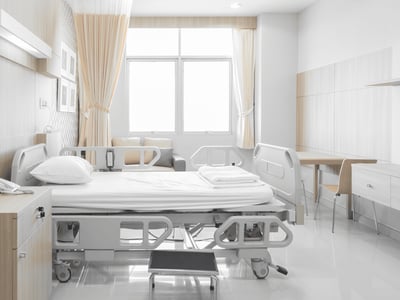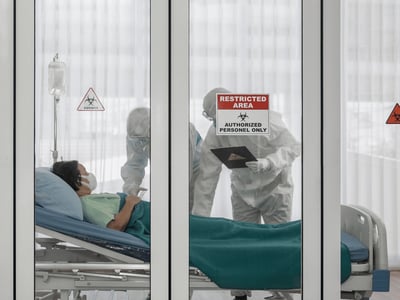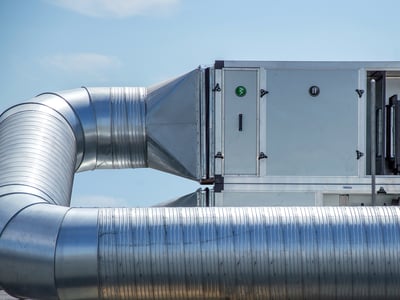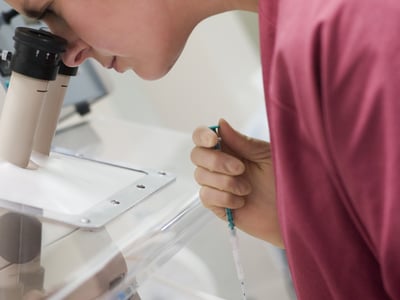Good indoor air quality plays a critical role in healing and wellness at hospitals and other healthcare facilities – lives may depend on it.
Hospitals are meant to be places of healing and wellness. They must maintain a high level of cleanliness to promote healing and good health, especially for patients in critical care units.
Yet studies have shown that the air quality inside many hospitals is poor. Studies also show that cleaner indoor air aids patient recovery and decreases physiological stress. As a result, hospital administrators might need to implement an air filtration strategy to combat the problem.
Hospitals, as well as nursing homes, dental offices and fertility clinics, must be a bastion of cleanliness and health. Critical equipment must also be protected from harmful substances that can interfere with their operation. Energy savings and flexible air filtration systems for operating theatres are also a high priority these days.
These goals are only achievable with a filtration system that is effective at removing even the smallest pollutants from the air. Air filtration from Camfil can hold the key to meeting these critical challenges.
Many hospitals also provide specialisation in order to offer better patient care. This applies for infectious disease units, oncology units or haematology units. In these units, highly skilled staff must deal with highly sensitive patients who require either extreme patient protection or specific nurse and doctor protection.
To address the issue and find the right air filtration solutions, it’s important to understand the major causes of poor air quality inside healthcare facilities.
Sick patients at healthcare facilities can unfortunately contribute to air quality that is less than ideal. Coughs can contaminate the air and surfaces within a hospital room or lab. Open wounds or infections can transfer viruses and bacteria from patients’ bodies onto surfaces such as bedpans, mugs, plates, silverware, bedding and other materials. Once these materials are disturbed, those contaminants become airborne.
Many public hospitals in large urban areas were constructed many years ago, when innovations in ducts and vents were not as highly advanced as they are today. As a result, the air drawn into the hospital may not be properly filtered through the outdated ductwork. So, common pollutants such as dust mites, dirt, pollen and airborne bacteria can more readily circulate through the vents.
Moisture presents a particular problem in ductwork. It often leads to problems such as mould and spores, not to mention the risk of salmonella and nosocomial infections, which can grow into a major health issue beyond compromised air quality alone.
Much of the air that circulates through a hospital is drawn in from the outside. The indoor air quality in many health facilities therefore largely depends on the outside air quality. Dangerous vehicle exhaust fumes and odours can pose a threat by entering the building via the HVAC system.
For more than 50 years, Camfil has been an industry leader in the design and manufacturing of air filtration systems that are innovative, functional and health affirming. Camfil places a high value on the efficiency of its products, and through rigid testing, has developed solutions to the most complex clean-air problems facing the world.

A room designed to house one or more occupants at a healthcare facility.

Single occupancy patient care rooms or areas designed to prevent the spread of airborne pathogens.

Operating rooms are the most demanding areas in a hospital environment. Ultra-clean operating rooms decrease the risk of infection, and the ventilation system plays an important role in ensuring patient safety during surgery.

Dentists, patients and staff need protection from airborne bacteria and viruses, mercury and disinfectants during routine dental work. Camfil filters help to capture these potentially harmful particles and gaseous chemicals.

Protect people, processes, products and equipment while keeping maintenance and energy costs low by keeping air handling units unclogged.

Nowhere are process cleanliness and air quality more critical than in in vitro fertilization labs, where studies show a direct relationship between clean air and procedural success.

Protect researchers from biological and chemical risk during their daily lab work, and maintain the safety of people and the environment by containing risk inside your facility.

Operating rooms are the most demanding areas in a hospital environment. Ensure patient safety during critical surgical procedures and provide a safer hospital by minimizing nosocomial contamination with proper air filtration.

Protect pharmacists and nurses when processing drugs, solvents and chemicals as well as your high-tech machinery with quality air filtration solutions.

When hospitals choose filter solutions for ventilation, their focus should be efficiency and reliability. Often cheaper solutions do not offer high-efficiency removal, energy savings, robustness and long terms reliability.
Air cleaners and air purifiers Life science and healthcare Virus Contamination Control Air quality
Find out how Camfil solutions can help you protect your patients and staff in your hospital
Air cleaners and air purifiers Life science and healthcareCombating the virus in the air. Maintaining a good level of hygiene and covering the mouth with a mask are good ways to stay protected but is this enough? Maintaining a hygienic and sanitary environment along with protection from those infected are vital as the virus thrives in contaminated conditions.
St James Hospital Prevents Aspergillus. Healthcare facilities must maintain the highest levels of cleanliness to promote health and healing. Camfil provides air cleaners for these environments. St. James Hospitaal in Dublin used Camfil for Aspergillus prevention.
As a place of healing and recovery, hospital air quality is even more important than the air quality at commercial offices and shopping malls. The purpose of a hospital is to return people to good health, and an essential aspect of this process is ensuring that airborne pollutants do not make existing conditions worse.
Starting the In Vitro Fertilisation (IVF) process can be an exciting and nerve-wracking experience for anyone needing help in conceiving a child.
Some processes are more sensitive than others. If you work in the food and beverage or life science industries, you know how tough the demands on clean air are. To be sure you have the right filter, look for the ProSafe symbol.